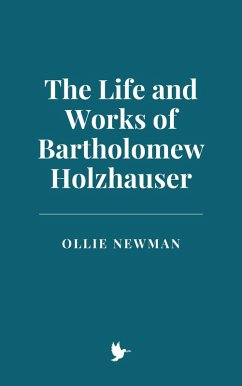
The Life and Works of Henri de Lubac (eBook, ePUB)

PAYBACK Punkte
0 °P sammeln!
Henri de Lubac (1896-1991) was a seminal 20th-century Catholic theologian whose work profoundly influenced the renewal of Catholic theology, particularly through his contributions to the Second Vatican Council. His theology was marked by a commitment to ressourcement-a return to the foundational sources of the faith, including Scripture, the Church Fathers, and the liturgy-while addressing the challenges of modernity.De Lubac's key theological contributions include his groundbreaking work on the relationship between nature and grace, particularly in Surnaturel: Études historiques (1946), wher...
Henri de Lubac (1896-1991) was a seminal 20th-century Catholic theologian whose work profoundly influenced the renewal of Catholic theology, particularly through his contributions to the Second Vatican Council. His theology was marked by a commitment to ressourcement-a return to the foundational sources of the faith, including Scripture, the Church Fathers, and the liturgy-while addressing the challenges of modernity.
De Lubac's key theological contributions include his groundbreaking work on the relationship between nature and grace, particularly in Surnaturel: Études historiques (1946), where he argued that human nature is intrinsically oriented toward God and cannot be understood apart from the supernatural. This insight challenged the rigid dualism of neo-scholastic theology and became central to contemporary Catholic thought. His reflections on the Church, articulated in works such as Catholicism: Christ and the Common Destiny of Man and Meditations on the Church, emphasized the Church as a sacrament of unity and a community called to reconcile humanity with God and one another.
De Lubac also critiqued secular ideologies in The Drama of Atheist Humanism, engaging deeply with thinkers such as Nietzsche, Marx, and Feuerbach. He demonstrated how atheistic humanism, while seeking to affirm human dignity, ultimately led to nihilism by rejecting the divine source of human identity and purpose. His work inspired the council's teachings on the dignity of the human person, the Church's engagement with the modern world, and the communal nature of salvation.
At Vatican II, de Lubac's theological vision shaped key documents, including Lumen Gentium and Dei Verbum. His insights on the unity of Scripture and tradition, the Eucharist as the foundation of the Church's unity, and the Church's mission in the modern world were instrumental in articulating a renewed vision of Catholicism.
In the post-conciliar period, de Lubac defended the council's reforms while cautioning against both reactionary resistance and unbridled innovation. His emphasis on fidelity to tradition and engagement with contemporary culture remains a guiding principle for the Church today. His legacy, characterized by intellectual rigor, spiritual depth, and pastoral concern, continues to inspire theological scholarship and ecclesial renewal, offering a vision of faith that is both timeless and profoundly relevant to the complexities of the modern age.
De Lubac's key theological contributions include his groundbreaking work on the relationship between nature and grace, particularly in Surnaturel: Études historiques (1946), where he argued that human nature is intrinsically oriented toward God and cannot be understood apart from the supernatural. This insight challenged the rigid dualism of neo-scholastic theology and became central to contemporary Catholic thought. His reflections on the Church, articulated in works such as Catholicism: Christ and the Common Destiny of Man and Meditations on the Church, emphasized the Church as a sacrament of unity and a community called to reconcile humanity with God and one another.
De Lubac also critiqued secular ideologies in The Drama of Atheist Humanism, engaging deeply with thinkers such as Nietzsche, Marx, and Feuerbach. He demonstrated how atheistic humanism, while seeking to affirm human dignity, ultimately led to nihilism by rejecting the divine source of human identity and purpose. His work inspired the council's teachings on the dignity of the human person, the Church's engagement with the modern world, and the communal nature of salvation.
At Vatican II, de Lubac's theological vision shaped key documents, including Lumen Gentium and Dei Verbum. His insights on the unity of Scripture and tradition, the Eucharist as the foundation of the Church's unity, and the Church's mission in the modern world were instrumental in articulating a renewed vision of Catholicism.
In the post-conciliar period, de Lubac defended the council's reforms while cautioning against both reactionary resistance and unbridled innovation. His emphasis on fidelity to tradition and engagement with contemporary culture remains a guiding principle for the Church today. His legacy, characterized by intellectual rigor, spiritual depth, and pastoral concern, continues to inspire theological scholarship and ecclesial renewal, offering a vision of faith that is both timeless and profoundly relevant to the complexities of the modern age.
Dieser Download kann aus rechtlichen Gründen nur mit Rechnungsadresse in A, B, CY, CZ, D, DK, EW, E, FIN, F, GR, H, IRL, I, LT, L, LR, M, NL, PL, P, R, S, SLO, SK ausgeliefert werden.













